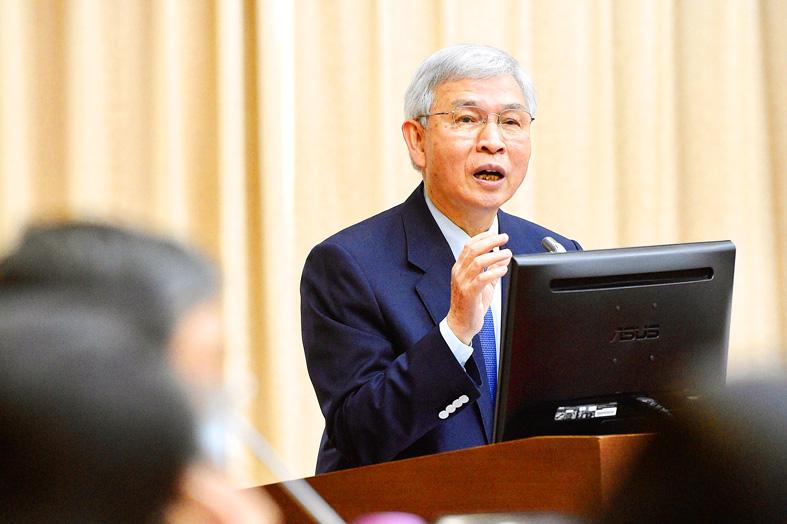Stable consumer prices, which are forecast to grow about 1.6 percent this year, indicate that Taiwan’s economy is not overheating and lend support to keeping interest rates unchanged, central bank Governor Yang Chin-long (楊金龍) said yesterday.
Yang made the remarks during a visit by lawmakers from the legislature’s Finance Committee to the central bank to inquire about monetary policy trends, and the economic outlook at home and abroad.
US Federal Reserve board members remain divided about the threat of inflationary pressures and might discuss whether to taper bond purchases during the Jackson Hole, Wyoming, economic policy symposium today, Yang added.

Photo: George Tsorng, Taipei Times
Fed members have said that US inflation of 5 percent is a temporary phenomenon to defend the bank’s money-printing policy and might hold on to current rates until early 2023, he added.
The US can invoke quantitative easing to bolster its economy, because the greenback is a major currency in which countries carry out and settle cross-border trade, Yang said.
The US dollar gains in value during bad times when investors take shelter in the currency — a tactic that other countries cannot imitate, he said.
Yang said he saw no urgency in raising interest rates in Taiwan, where inflationary pressures are mild and benign.
“Inflation sits atop the list of concerns when the central bank draws its monetary policy,” he said.
Consumer prices are expected to increase 1.6 to 1.7 percent this year, suggesting that the economy is not overheating and there is no need for sweeping tightening measures, he said.
The central bank is due to review its monetary policy next month.
Taiwan’s policy rate, currently at a record low of 1.125 percent, is not particularly loose when compared with negative interest rates in Japan and Switzerland, Yang said.
Latin American countries, such as Peru, Chile, Brazil and Mexico, have to raise interest rates to cope with imported inflation, which is not a serious issue in Taiwan, he said.
Taiwan’s economic growth, while vibrant, is largely supported by exports, which have benefited from US-China trade tensions and a severe chip shortage, Yang said.
However, domestic demand-reliant sectors have taken a hard hit from a local COVID-19 outbreak that started in May, he added.
Uneven economic growth lends support to accommodative monetary policy and the government’s plan to issue consumption vouchers to help energize domestic demand, he said.

MULTIFACETED: A task force has analyzed possible scenarios and created responses to assist domestic industries in dealing with US tariffs, the economics minister said The Executive Yuan is tomorrow to announce countermeasures to US President Donald Trump’s planned reciprocal tariffs, although the details of the plan would not be made public until Monday next week, Minister of Economic Affairs J.W. Kuo (郭智輝) said yesterday. The Cabinet established an economic and trade task force in November last year to deal with US trade and tariff related issues, Kuo told reporters outside the legislature in Taipei. The task force has been analyzing and evaluating all kinds of scenarios to identify suitable responses and determine how best to assist domestic industries in managing the effects of Trump’s tariffs, he

TIGHT-LIPPED: UMC said it had no merger plans at the moment, after Nikkei Asia reported that the firm and GlobalFoundries were considering restarting merger talks United Microelectronics Corp (UMC, 聯電), the world’s No. 4 contract chipmaker, yesterday launched a new US$5 billion 12-inch chip factory in Singapore as part of its latest effort to diversify its manufacturing footprint amid growing geopolitical risks. The new factory, adjacent to UMC’s existing Singapore fab in the Pasir Res Wafer Fab Park, is scheduled to enter volume production next year, utilizing mature 22-nanometer and 28-nanometer process technologies, UMC said in a statement. The company plans to invest US$5 billion during the first phase of the new fab, which would have an installed capacity of 30,000 12-inch wafers per month, it said. The

‘SWASTICAR’: Tesla CEO Elon Musk’s close association with Donald Trump has prompted opponents to brand him a ‘Nazi’ and resulted in a dramatic drop in sales Demonstrators descended on Tesla Inc dealerships across the US, and in Europe and Canada on Saturday to protest company chief Elon Musk, who has amassed extraordinary power as a top adviser to US President Donald Trump. Waving signs with messages such as “Musk is stealing our money” and “Reclaim our country,” the protests largely took place peacefully following fiery episodes of vandalism on Tesla vehicles, dealerships and other facilities in recent weeks that US officials have denounced as terrorism. Hundreds rallied on Saturday outside the Tesla dealership in Manhattan. Some blasted Musk, the world’s richest man, while others demanded the shuttering of his

Taiwan’s official purchasing managers’ index (PMI) last month rose 0.2 percentage points to 54.2, in a second consecutive month of expansion, thanks to front-loading demand intended to avoid potential US tariff hikes, the Chung-Hua Institution for Economic Research (CIER, 中華經濟研究院) said yesterday. While short-term demand appeared robust, uncertainties rose due to US President Donald Trump’s unpredictable trade policy, CIER president Lien Hsien-ming (連賢明) told a news conference in Taipei. Taiwan’s economy this year would be characterized by high-level fluctuations and the volatility would be wilder than most expect, Lien said Demand for electronics, particularly semiconductors, continues to benefit from US technology giants’ effort